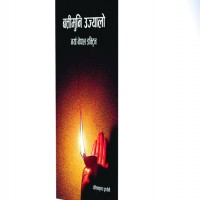Treacle Of Optimism
Aashish Mishra
Light a lamp, any lamp. Light it bright and see it illuminate the entire room. But look right underneath it and you will find darkness. The space closest to the source of the light is pitifully also the space that is the darkest. But Ashbinkumar Pudasaini says that it need not be. He rejects this pessimistic reality and presents a hopeful and positive outlook on life through his book aptly titled Battimuni Ujyalo (Brightness Under the Light).
The book officially describes itself as a collection of reflective articles about Nepal’s democracy, development and diplomacy but the reader need only read the first chapter, which takes its name from the title of the book, to realise that it is so much more. Perhaps it would be more accurate to describe Pudasaini’s work as a literary treacle of optimism and energy.
The volume contains 62 chapters divided into three sections – Society and Culture, Finance and Management and Politics and Diplomacy. The linguistic presentation is simple and easy to read and poetic and soulful at the same time. The reader does not feel burdened by the read and is able to easily move from page to page. The chapters are short, yet complete, which can be called a speciality of this book. The chapter names are enticing and inviting, especially in the Society and Culture section. All in all, this book is a testament to the fact that complex, philosophical and deeply technical matters can be presented plainly and concisely without losing the meaning and gravitas of the issues. The writer is not pretentious which makes his writings amiable.
Pudasaini is a multi-faceted person who has been an advisor to the Foreign Minister, is involved in teaching management courses at various colleges and is currently working as the head of the Training and Development Division of Nepal Bank. In addition, he also holds extensive experience in journalism specialises in participatory development. All this is well reflected in the insights he presents Battimuni Ujyalo.
The Society and Culture section of the book seeks to guide the people of the society, especially the younger generation. It tries to motivate the readers to be the light that lights up the lives of everyone around them. Hajurbako CCTV (Grandfather’s CCTV) stands out from the other 19 chapters of the section because it conveys a deeply philosophical and metaphorical lesson in a very uncomplicated manner. It tells us to be aware of our actions because they are always being watched. It preaches without being preachy and that is a theme that is present throughout the book.
The second and third sections Finance and Management and Politics and Diplomacy are more straightforward compared to the first and deal with facts about Nepal’s plans, policies, development, finances, international standing and the like. The sections are not dry by any standard but they are not as transcendent as the first one, maybe by virtue of the subject matters they deal with.
However, the central focus of the book appears to Prime Minister KP Sharma Oli. The writer discusses Oli’s governance and leadership at great length and makes no secret of the fact that he supports his foreign policies which Pudasaini calls the ‘Oli doctrine’. He views this doctrine as an ideal that should guide future governments in their diplomatic endeavours. Pudasaini makes it clear that he admires Oli’s nationalistic stance, uncompromisingly firm posture on sovereignty and territorial integrity and the desire to maintain friendly relations with both of Nepal’s neighbours. Most of the acclaim dispensed at the Prime Minister is rightful, based on his actions while in office. The writer has not manufactured information nor has he pursued rumours. His admiration of KP Sharma Oli is based on facts and verifiable information.
Nevertheless, rightful or not, that admiration sometimes crosses into the territory of idolisation. One cannot help but feel that the book is overly generous with crediting Nepal’s foreign policy successes to Prime Minister Oli while neglecting the support he received from his cabinet and team. One glaring example of this is how the book does not even give a passing mention to Foreign Minister Pradeep Gyawali. Similarly, it does not talk about some of the Prime Minister’s perceived foreign policy blunders such as publicly accusing India of trying to use his domestic political opponents to oust him from office. As a book that intends to outline how Nepal should conduct its diplomacy, it also does not discuss Nepal’s past diplomatic successes which makes the book’s reflections and commentary incomplete.
Nevertheless, the book succeeds in inciting hope about the future. It shows that Nepal has been taking steps in the right direction and that future can hold good things if we continue in this path. It urges Nepalis residing abroad to return home with their skills, knowledge and experience. It advises the authorities on the measures they can take to improve Nepal’s healthcare, education and banking. It tells us that there need not always be darkness under the lamp.
Recent News

Do not make expressions casting dout on election: EC
14 Apr, 2022
CM Bhatta says may New Year 2079 BS inspire positive thinking
14 Apr, 2022
Three new cases, 44 recoveries in 24 hours
14 Apr, 2022
689 climbers of 84 teams so far acquire permits for climbing various peaks this spring season
14 Apr, 2022
How the rising cost of living crisis is impacting Nepal
14 Apr, 2022
US military confirms an interstellar meteor collided with Earth
14 Apr, 2022
Valneva Covid vaccine approved for use in UK
14 Apr, 2022
Chair Prachanda highlights need of unity among Maoist, Communist forces
14 Apr, 2022
Ranbir Kapoor and Alia Bhatt: Bollywood toasts star couple on wedding
14 Apr, 2022
President Bhandari confers decorations (Photo Feature)
14 Apr, 2022










